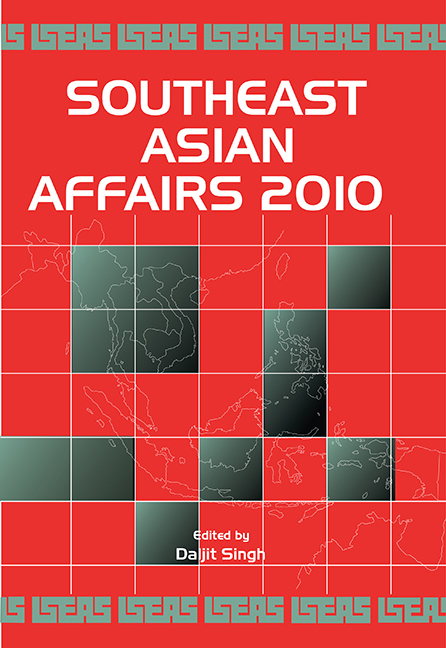Foreword
Published online by Cambridge University Press: 21 October 2015
Summary
The good news in 2009 was that the global economic crisis affected Southeast Asia less than had earlier been feared, and towards the end of the year most regional countries were poised for a sharp recovery. Yet, uncertainties and challenges for the future remained in view of the sluggish growth and indebtedness in the developed world.
In the realm of politics, the re-election of President Susilo Bambang Yudhoyono in Indonesia with a landslide majority in a peaceful election was a clear plus for both Indonesia and the region, notwithstanding the unfortunate attempts towards the later part of the year by certain forces to weaken the anti-corruption efforts of the government and to undermine two widely respected members of the President's government, namely Vice-President Boediono and Finance Minister Sri Mulyani, over the issue of the bailout of Bank Century.
Politics in Malaysia was unsettled while in Thailand it remained tumultuous. In Malaysia, Prime Minister Najib Tun Razak's well-conceived 1Malaysia concept seemed to lose its momentum amidst racial and religious tensions caused partly by attacks by extremists on religious establishments. Political uncertainty was also accentuated by the impending trial of opposition leader Anwar Ibrahim on sodomy charges. In Thailand, the destabilizing and disruptive street politics used by the anti-Thaksin yellow shirted mobs in 2008 to oust perceived pro-Thaksin governments were emulated in 2009 by the pro-Thaksin red shirts against Prime Minister Abhisit.
Politics in the rest of Southeast Asia was comparatively more quiescent and “normal”. In Myanmar, always an exception to the Southeast Asian norm, the generals were preparing for elections in 2010 for a new constitutional order that would be dominated by the military.
Meanwhile, the Association of Southeast Asian Nations (ASEAN) continued its evolution towards a more rules-based organization with the efforts directed at strengthening procedures for dispute settlement and implementation of agreements. During the year a comprehensive free trade agreement (FTA) was concluded with Australia and New Zealand and another involving trade in goods was signed with India. Meanwhile the FTA with China on trade in goods was due to be implemented on 1 January 2010, even though tariff reductions with China had been proceeding for some years.
- Type
- Chapter
- Information
- Southeast Asian Affairs 2010 , pp. vii - viiiPublisher: ISEAS–Yusof Ishak InstitutePrint publication year: 2010



